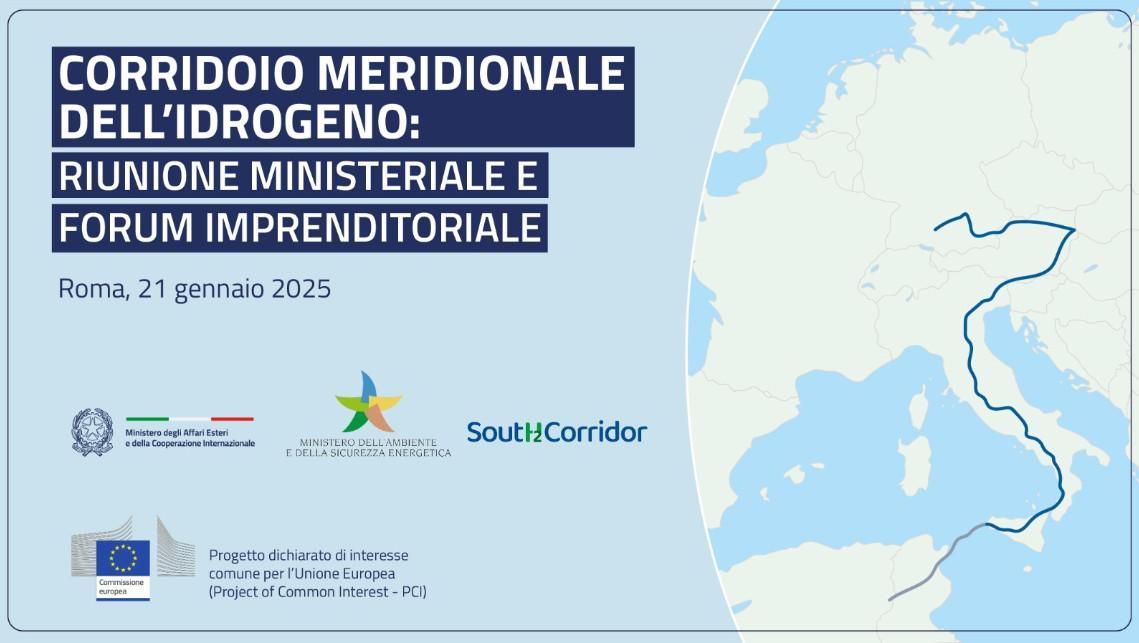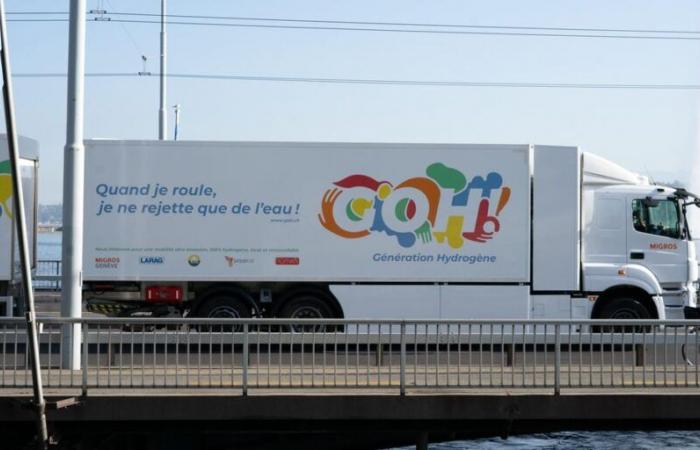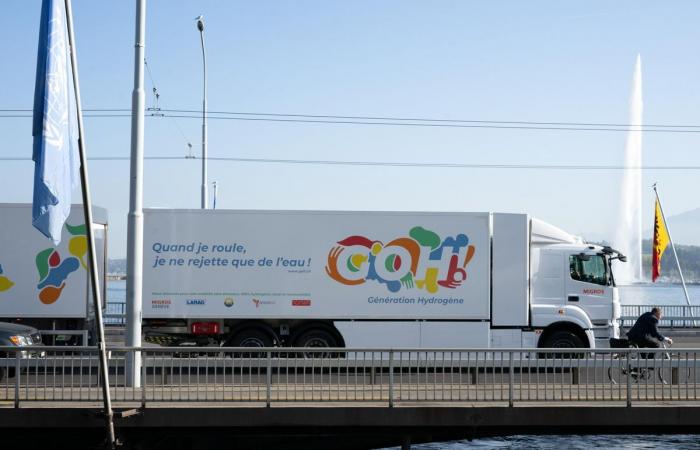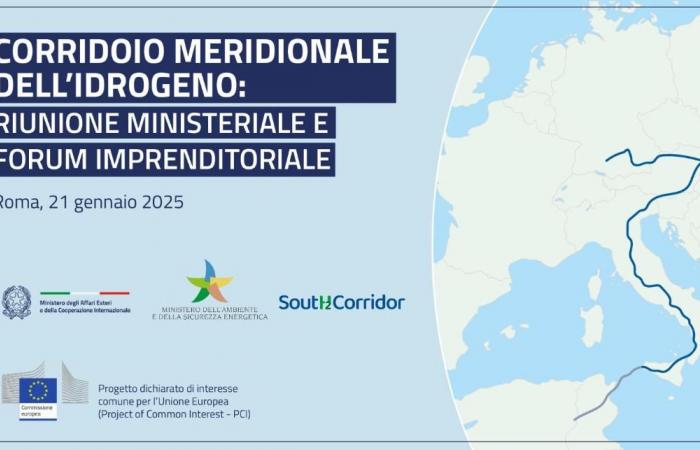ThoseAlternative to batteries –
“On hydrogen, Bern does not take over”
The sector meets in Morges while “the era of hydrogen” is beaten in a breach. By Trump. And in the Confederation plan.
Posted today at 07:34
Commissioning by Migros of the first 40 electric tonnes Goh! – Food by a fuel cell, operating in hydrogen – in 2022 in Geneva.
Subscribe now and take advantage of the audio reading function.
Bottal
- Financial and political support for a gas supposed to play a key role in the energy transition is stretching in several countries.
- Lombard Odier experts no longer see him playing “only a satellite role in the transition”.
- Presented a month ago, the Swiss Federal Plan remains little ambitious and without planned funding, denounces the sector, which meets this Thursday.
Of course, ambitious projects related to hydrogen continue to be deployed – again on Tuesday, Germany, Austria and Italy committed On a gas pipeline to allow it to be raised from the Sahara sun. But, from one country to another, how not to see the face of support – political, financial – for this gas called to play a central role in the energy transition, two years ago?
In the United States, of course. Trying to erase all traces of “new deal green ”, President Trump pausedthis Tuesday by decree, public silver payments to build a network of regional “hubs” distributing “green” hydrogen. In Switzerland, the hydrogen strategypresented at the end of 2024 by the Confederation, was mainly distinguished by the lack of deployed means.

This Tuesday, Italy, Germany, Austria, Algeria and Tunisia signed a declaration of common intention on the southern hydrogen corridor – which aims to transport this renewable gas over 3300 kilometers from the ‘North Africa.
Italian embassy in Berlin
Even the experts of the Lombard Odier bank, very committed to investments linked to the energy transition, admitted Tuesday-in the wake of the US withdrawal from the Paris climate agreement-that hydrogen, “given of [son] high cost and [son] Lack of competitiveness, should not be considered playing more than a satellite role in the transition. ”
Has the advent of the age of hydrogen already passed? Thursday, during Hydrogen meetings 2025 In Morges, Benoît Revaz, director of the Federal Energy Office, was to expose the strategy of the Confederation to the sector officials – starting with the directions of Alpiq, Romande Energie or Gazat.
The opportunity to take stock, on the sidelines of the event, with Jean-François Weber, founder of Greengt-Morges company specializing in the design of hydrogen batteries. As well as with Jean-Luc Favre, president of the Nomads Foundation, at the origin of the H network2.
Again two years ago, hydrogen was presented as a pillar of the energy transition. Ambition called into question for lack of political and financial support?
J.-F. Weber (GreenGT): It is more important than ever to reassure these decision -makers. By reminding them of the stages already taken. Faced with the extent of the required investments, we cannot just regret that everything is not already in place. We speak here of about fifteen years of effort, necessary to set up a supply network modeled on that of traditional service stations-first for heavy goods vehicles, then the cars. Not to mention the fuel batteries that will be used for individual housing, public works companies or airports – like so many clean generators. It takes time-it is enough to see how the mesh of charging stations for battery vehicles is still pointed out … while the underlying electrical network has been in place for decades.
-Well, but the financiers are talking about too high costs, lack of competitiveness …
J.-F. W.: Except that these obstacles do not come from technology. To get out of diesel, there are only two solutions. The battery – always too heavy to move a 40 -ton heavy goods vehicle. Or the fuel cell. In Europe, the manufacturers of these batteries are able to provide tens of thousands, which they cannot sell, for lack of hydrogen availability. Over the next decades, if we decide to turn the page on oil and stop nuclear electricity, what will remain for transport? Hydrogen, the path in which Korea, Japan, is committed-I’m not even talking about China, which already makes post-batterie technology. So many countries facing oil dependence similar to ours.
The hydrogen truck has been highlighted in Switzerland for years. Is he condemned to play only a window role?
J.-F. W.: Switzerland remains the country which has the greatest number of these trucks per capita. Those provided by Hyundai have been running without discontinuing for seven years. And the only problem of its operators remains to refuel-while … two stations are available in French-speaking Switzerland and seventeen overseas. This remains the main obstacle, while countries like France and Germany deploy corridors of motorway stations. As a result, we stay far from the thousand heavy goods vehicles mentioned by Hyundai during its European launch – here, in Switzerland.
The Hydrogen Master Plan, presented by the Confederation in mid-December, has the effect of a cold shower for the sector …
Jean-Luc Favre (Nomads): The good news is that there is finally one. The bad is that, in fact, no funding is planned. We rely on a connection to the European network in 2035, hoping that others will have done the work. At the federal level, the authorities do not take over, as in the cantons of Geneva and Vaud. After the development of a demonstrator by Greengt and Migros – the camion GoH! 40 tonnes -, a Geneva public investment fund on hydrogen of 10 million had been launched. It’s all about level of ambition …
Precisely, was this level of ambition not revised downwards in Bern?
J.-L. F.: The level of ambition which is reflected in the federal plan remains low and concerns, up to 2035, the development of local ecosystems including the production of small quantities of hydrogen for heavy transport and industry – a short circuit tested in Geneva and in the canton of Vaud. What is lacking is a strong private-public partnership with a Confederation that supports financing for production, distribution and uses. In order to go beyond what can be done at the cantons. Otherwise it will mean increasing our dependence on European, even Chinese actors, locking the market and technology.
“Latest news”
Do you want to stay at the top of the info? “Tribune de Genève” offers you two meetings per day, directly in your e-mailbox. To not miss anything of what is happening in your canton, Switzerland or in the world.
Other newsletters
Connect
Pierre-Alexandre Sallier is a journalist at the Economy section since 2014. Previously he worked for Timeas well as for everyday life The platformin Paris.More info
Did you find an error? Please report it to us.
0 comments








